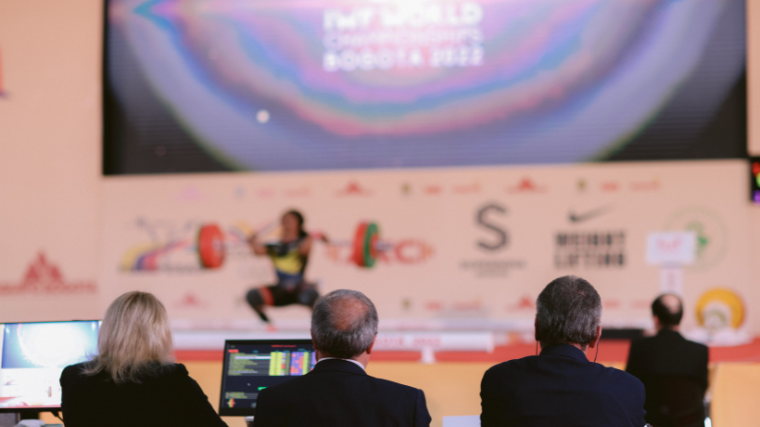Californians will feel a very different earth-shattering sensation than they’re used to in the summer of 2028; that of barbells hitting the platform in the Olympic stadium. On Monday, Oct. 16, 2023, news broke that the International Olympic Committee (IOC) has confirmed weightlifting’s status as a Games event for the 2028 Olympics in Los Angeles.
After years of tumult and bureaucratic uncertainty, which placed the sport on a razor’s edge of losing its tenured status as an Olympic event, the International Weightlifting Federation (IWF) delightfully upheld the news in a press release and praised the IOC’s decision.
https://www.instagram.com/p/CydEwRhoBQ4/?img_index=1
[Related: What Olympic Quota Cuts Mean for Athletes and Fans of Weightlifting]
“Today’s news protects the dreams and ambitions of millions of athletes around the world and provides much needed certainty for all stakeholders of the sport,” the IWF remarked in its presser.
How We Got Here
Fans of and competitors in weightlifting have spent nearly a decade in rapt suspense over the fate of Olympic lifting as a Games-recognized event. The number of weightlifters allowed to compete at the Olympics in weightlifting has steadily dwindled over the past decade. There are only 120 slots allowed for next year’s games in Paris, down from 196 at the 2020 Games in Tokyo and 260 at Rio 2016; Paris will host the fewest Olympic lifters since 1956.
Advancements in retroactive drug testing have routinely apprehended offenders within weightlifting from both Beijing 2008 and London 2012. Further, the publication of a scandalous report in June of 2020 detailing extensive bureaucratic corruption and crime within the IWF had also soured weightlifting’s reputation with the IOC and, by December 2021, they had tentatively removed the sport from the 2028 Programme.

However, progressive initiatives following the Tokyo Olympics (held in 2021 due to COVID-19-relayed delays) indicated that operations within the IWF to curtail drug use and refurbish the sport’s reputation were underway. After ousting former IWF President Tamás Aján, the organization under current President Mohammed Jalood has reported greater diversity within its governance and, more importantly, far fewer positive drug tests for weightlifting athletes in recent years.
The IWF submitted a report to the IOC in March of 2023 outlining its newfound commitment to clean sport and, at the IOC Session in Mumbai, India in mid-October, the Committee granted weightlifting a seat at the table in 2028.
To broadly recap the timeline:
- Weightlifting (along with other events like boxing and the pentathlon) has historically struggled with policing and preventing the usage of performance-enhancing drugs by its athletes.
- As such, the IOC opted to gradually marginalize the sport’s presence at the Games, with Tokyo hosting the fewest weightlifting athletes in over half a century.
- The publication of the McLaren report in 2020, which detailed extensive corruption within the IWF, forced the IOC’s hand and contributed to the sport being tentatively pruned from the Games Programme for 2028.
- New leadership within the IWF, elected after prior President Aján was forcibly ousted, have made great strides in rehabilitating the sport’s image on the international stage.
- The IWF’s recent efforts have resulted in weightlifting’s confirmation as a Games event for Los Angeles 2028.
In the celebratory press release, IWF President Jalood made the following comments: “[This] should not be seen as an end. We must — and will — continue, in line with our strategic priorities, towards a new future for weightlifting as a healthy, modern, and athlete-centered sport.”
More Weightlifting Content
- 2023 IWF World Weightlifting Championships Full Results
- USA Weightlifting Announces Roster for Upcoming Pan American Games
- Hampton Morris Wins First USA Gold Medal in Over 50 Years
Featured Image: William Johnson